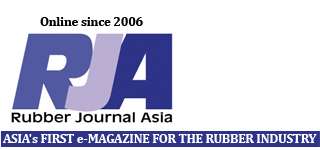 Sri Lankan tyre maker Global Rubber Industries (GRI) has unveiled a visionary strategy aimed at dramatically increasing its presence and sales in the agricultural tyre market worldwide, according to Founder/Managing Director, Prabhash Subasinghe. It expects to extend significantly across key global markets including Europe, the Americas, the Asia Pacific, and the Middle East.
Sri Lankan tyre maker Global Rubber Industries (GRI) has unveiled a visionary strategy aimed at dramatically increasing its presence and sales in the agricultural tyre market worldwide, according to Founder/Managing Director, Prabhash Subasinghe. It expects to extend significantly across key global markets including Europe, the Americas, the Asia Pacific, and the Middle East.
Subasinghe said the company has an eye on tripling agricultural tyre sales in the next three years.
GRI’s roadmap for growth is ambitious, focusing on enlarging its footprint across continents. The strategy revolves around enhancing factory utilisation and boosting production capabilities, especially at its advanced facility in Badalgama, where intends to up its production from 60 to 100 tonnes per day by 2026.
Since its inception in 2002, GRI has transcended its beginnings as a solid tyre manufacturer, embracing the production of pneumatic off-highway tyres in 2018. This transition is part of a broader US$100-million expansion strategy of the company.
Subasinghe also highlighted the increasing demand for agricultural tyres across the globe, with Europe leading the way, which currently represents a significant portion of GRI’s sales in this segment.
With a strategic network of nearly 100 employees across nine legal entities in Europe, GRI is well-equipped to navigate the complexities of the market, it adds. This extensive network supports both B2B and B2C transactions, allowing GRI to offer a diverse range of products directly to consumers and businesses alike.
GRI’s venture into the solid tyre market laid the groundwork for its expansion into specialty tyre segments. Through partnerships with major OEMs like Kion Group and Caterpillar, GRI has established a reputation for delivering top-tier products, setting the stage for its ambitious expansion plans, it adds.
Meanwhile, while GRI remains focused on enhancing production within Sri Lanka, future plans could include establishing manufacturing facilities internationally.
GRI’s strategic expansion plans promise not only to transform the company’s operations but also to reshape the agricultural tyre market.
GRI aims to triple its agricultural tyre sales through a combination of strategic global expansion, increasing production capabilities, and enhancing product innovation. The company plans to capitalise on the growing demand for agricultural tyres, particularly in Europe, North America, the Asia Pacific, and the Middle East. By investing in state-of-the-art manufacturing facilities and focusing on both B2B and B2C market segments, GRI intends to offer a wider range of high-quality, innovative tyre products tailored to the specific needs of the agriculture industry.
The European market plays a crucial role in GRI’s sales strategy, as it currently accounts for half of the company’s sales in the agricultural tyre segment. Europe’s strong demand for high-quality agricultural tyres aligns with GRI’s commitment to innovation and quality. The company has established a significant presence in Europe, with nearly 100 employees spread across nine legal entities, allowing GRI to effectively serve the region’s diverse market needs through both direct sales and distribution channels.
GRI’s product portfolio is strategically designed to cater to both B2B and B2C segments. For B2B customers, including OEMs and large agricultural operations, GRI offers specialized tyres that meet the rigorous demands of commercial agricultural use. These partnerships are strengthened by GRI’s commitment to quality and innovation, making it a preferred supplier for many industry leaders.
For B2C customers, GRI leverages its global distribution network to offer a wide range of agricultural tyres directly to end-users, ensuring that farmers and small-scale agricultural businesses have access to high-quality, durable tyres that enhance the efficiency and productivity of their operations.
While GRI is currently focused on expanding its manufacturing capabilities within Sri Lanka, the company is also considering establishing manufacturing facilities in other countries as part of its long-term growth strategy. This potential expansion abroad would enable GRI to better serve its global customer base, reduce logistics costs, and mitigate risks associated with geopolitical and economic fluctuations. By exploring opportunities for international manufacturing, GRI aims to reinforce its commitment to becoming a global leader in the agricultural tyre market and to ensure it can meet the growing demand for its products worldwide.
